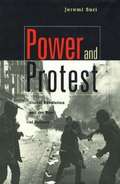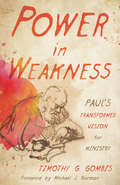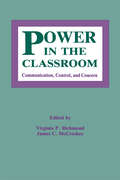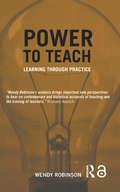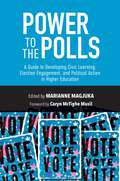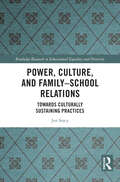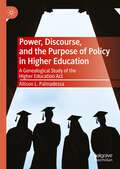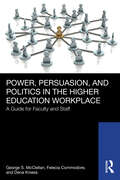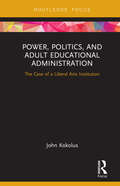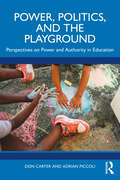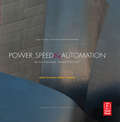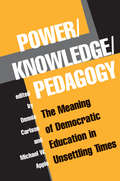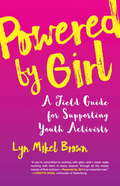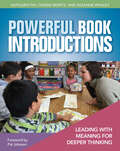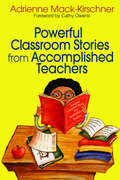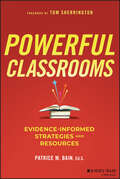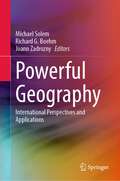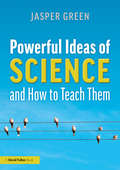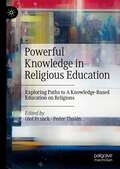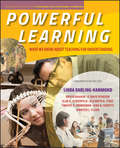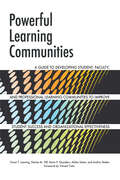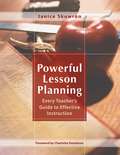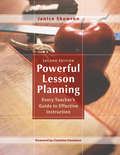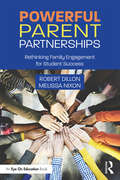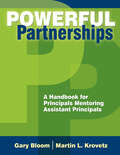- Table View
- List View
Power and Protest
by Jeremi SuriJeremi Suri puts the tumultuous 1960s into a truly international perspective in the first study to examine the connections between great power diplomacy and global social protest.
Power in Weakness: Paul's Transformed Vision for Ministry
by Timothy G. GombisEnvisioning cruciform community built on resurrection hope After Paul&’s encounter with the risen Christ on the road to Damascus, he turned from coercion and violence to a ministry centered on the hope of Christ&’s resurrection. In earthly terms, Paul had traded power for weakness. But—as he explained in his subsequent letters—this &“weakness&” was actually the key to flourishing community that is able to experience God&’s transformation, restoration, and healing. What would it mean for pastors today to take seriously Paul&’s exhortation in 1 Corinthians 11:1 to &“imitate me as I imitate Christ&” and lead their congregations in this way? Instead of drawing leadership principles and practices from the worlds of business, education, and politics—which tend to orient churches around institutional power and image maintenance—Timothy Gombis follows Paul in resisting the influence of the &“present evil age&” by making cruciformity the operating principle of the church. Gombis guides the reader through practices and patterns that can lead a congregation past a focus on individual salvation, toward becoming instead a site of resurrection power on earth.
Power in the Classroom: Communication, Control, and Concern (Routledge Communication Series)
by Virginia P. Richmond James C. McCroskeyIn the belief that power is something that is negotiated by participants in the instructional process and with the goal of understanding how communication and power interact, this book looks at power and instruction in many different ways. Drawing from the lessons of the social sciences generally, it examines research that has been conducted by instructional communication specialists, looks at newer approaches to power, presents a status report on what is now known, and points to the divergent directions that offer opportunities for future scholarship.
Power to Teach: Learning Through Practice (Woburn Education Series)
by Wendy RobinsonThis book illustrates hitherto unexamined connections between the present state of teacher education in the UK and past models of practice. It locates contemporary debates within ongoing historical tensions over what constitutes a sound and proper start to a career in teaching. Questions as to the constituents of a professional training, the essential skills, knowledge and attitudes desired of an effective teacher, the most suitable locus of expertise, the relative roles of participants, and the balance of theory and practice lie at the heart of this book. The book reviews apprenticeship and teach-exemplar models of training, expert-novice relationships, model and demonstration teaching, school-based practice and the elaboration of core pedagogical principles in educational debate and research. These developments are assessed against recent initiatives in ITT, such as partnership models of ITT, school-based mentoring, advanced skills teaching, training schools, a standards-driven model of assessment for student teachers and models of effective teaching. Central to the book is the concept of the power to teach. By reclaiming this notion, the book offers challenging new perspectives on current policy and practice in teacher education today and adds to existing histories of teacher training of the past.
Power to the Polls: A Guide to Developing Civic Learning, Election Engagement, and Political Action in Higher Education
by Marianne MagjukaGiven that students are increasingly arriving on campus with limited civic knowledge, and the fragile state of our democracy, there is an urgent need to incorporate civic learning into courses, programs, systems, and processes throughout our institutions. This book provides administrators, student affairs educators, and faculty with frameworks and examples for developing initiatives and programs to promote students’ civic learning and democratic engagement; set sustainable, campus-wide goals; track student learning outcomes; and make data-driven decisions that impact the campus climate for civic engagement.For many campuses, the first step is to assemble a diverse team of faculty, staff, students, and community partners to review existing programs; research national organizations that offer data, support, and benchmarks for sustainable initiatives; identify examples of practice such as those described in this book; and consider the diversity of the student body and local community, their needs, and the opportunities they offer.Beyond two opening chapters that provide foundational grounding for this work, this volume offers nineteen emerging and promising examples of how a range of institutions—from community colleges and liberal arts universities to state and Research One institutions—are addressing the need for civic learning, promoting civil political discourse, engaging students in voter registration and mobilization, and on how to work with legislators on issues—and how to promote this work on a non-partisan basis.The chapters identify a wide range of resources and organizations that support the work of civic engagement both nationally—such as AAC&U, Campus Compact, NASPA, Institute for Democracy & Higher Education, the National Study of Learning, Voting, and Engagement, and the Center for Information & Research on Civic Learning and Engagement—and at the state level.When designed and executed well, civic learning programs can foster competencies for lifelong citizenship and inspire young people to see themselves as civic actors and problem-solvers, to seek diverse viewpoints and perspectives, and to make change in their communities. This book offers ideas, resources, and frameworks to undertake this vital task.
Power, Culture, and Family–School Relations: Towards Culturally Sustaining Practices (Routledge Research in Educational Equality and Diversity)
by Jen StacyPower, Culture, and Family–School Relations: Towards Culturally Sustaining Practices explores the extent to which common practices in school-based family outreach advance equity or sustain the status quo in power and cultural relations. Using a rich ethnographic account of a school-based family literacy program in Nebraska, the book unfolds the daily cultural practices of the program so that readers may visualize and contemplate how and if the program serves newcomer and refugee families within the unique context of the New Latine Diaspora. The author draws upon critical theory to showcase how neoliberal and deficit ideologies are at play throughout the different aspects of the program, the influence these ideologies have on the participants, and the tactics used by the caregivers to resist and change the programmatic structures and curriculum to meet their needs. As such, the book invites educators, administrators, and scholars into the nebulous and difficult conversation about how schools, paradoxical entities that often colonize but prospectively liberate, must not just rethink how they work with parents and caregivers but rather dismantle traditional cultural practices that seek to assimilate minoritized families. Showcasing the power of ethnography as a tool which can be used to support educators and scholars to understand cultural elements of family outreach programs on a semiotic level, and how transforming these semiotic building blocks can lead to equitable relationships, it will appeal to scholars and researchers with interests in adult education, social foundations of education, critical ethnography, multilingual Adult Basic Education, and family outreach.
Power, Discourse, and the Purpose of Policy in Higher Education: A Genealogical Study of the Higher Education Act
by Allison L. PalmadessaThis book traces the full history of the Higher Education Act of 1965 in its entirety, to the present. The fifty-six-year history of this landmark legislation is analyzed as a genealogical phenomenon through multiple methodological and theoretical frameworks. This allows the researcher to study the Act not in a linear or single approach, rather the blend of lenses and methods creates a means to study policy-making as a site of ideological reproduction and results in the exposure of power dynamics that obfuscate the hidden agenda by those in positions of power.
Power, Persuasion, and Politics in the Higher Education Workplace: A Guide for Faculty and Staff
by Felecia Commodore George S. McClellan Dena KniessThis invaluable resource supplies foundational knowledge and expert strategies on navigating the workplace dynamics of power, persuasion, and politics across higher education.Despite burnout, compassion fatigue, and questions of privilege and oppression being at the forefront of academia, little if any attention is given to the political aspects of professional practice across the array of campus administrative and academic units. By masterfully leveraging scholarly literature on power, persuasion, and politics with the tried-and-true collegiate expertise of the contributing authors, faculty and staff will develop the knowledge and skills they need to negotiate the pervasive, often intimidating political behavior that dominates the higher education workspace.The ultimate guide to understanding, engaging, and thriving in the campus workplace, this book belongs in the hands of all higher education professionals.
Power, Politics, and Adult Educational Administration: The Case of a Liberal Arts Institution
by John KokolusThis book seeks to draw out the impacts of power, politics, and critical theory on the growth of adult learning in a small liberal arts college setting. Using critical theory as an analytical tool to investigate questions around budgeting, academic quality, and student access, this volume shows how these issues are inextricably bound up with those of hegemony, ideology, and bureaucratic rationality. The author demonstrates, too, how acknowledging these influences at the outset leads to a sustainable and equitable adult learning environment. Through an emphasis on both organizational context and individual learning experiences, this volume contributes new substance to the understanding of politics and power relationships in educational leadership.
Power, Politics, and the Playground: Perspectives on Power and Authority in Education
by Don Carter Adrian PiccoliPresented as a series of case studies, this book offers the reader an insider’s account of the power dynamics in Australian education and how the application of that power influences education policymaking.The authors, Adrian Piccoli and Don Carter, have been in the room when some of the biggest decisions in Australian education have been made. This book traverses various theories of power and authority to explore the selected experiences of the authors who come from opposing sides of the political spectrum (a former National Party minister for education and a former teacher, union member and left-leaning academic) to share a behind-the-scenes story of education in Australia not readily available to the public. The chapters capture their personal experiences in senior education leadership roles, where they made key decisions on diverse topics such as how to allocate multibillion-dollar education budgets, the split of school funding between education sectors, contentious curriculum decisions and other policy and political objectives. Drawing on organisational theory, international relations and education, a variety of resources such as hard and soft power, credibility, persuasion and notions of capital are used to make sense of their experiences in education. Through this, the authors explain who has the biggest influence over those decisions and why these complex power dynamics, when not used properly, can mean that the best interests of students are not always at the heart of the decision-making process.Written for teachers, school leaders and other education professionals, this book presents a rare insight into power and authority in the Australian education system.
Power, Speed & Automation with Adobe Photoshop: (The Digital Imaging Masters Series) (The\digital Imaging Masters Ser.)
by Geoff Scott Jeffrey TranberryThis is a must for the serious Photoshop user! Power, Speed & Automation explores how to customize and automate Photoshop to increase your speed and productivity. With numerous step-by-step instructions, the authors-two of Adobe's own software developers!- walk you through the steps to best tailor Photoshop's interface to your personal workflow; write and apply Actions; and use batching and scripts to process large numbers of images quickly and automatically. You will learn how to build your own dialogs and panels to improve your production workflows in Photoshop, the secrets of changing keyboard shortcuts and menus, and ways to tune your system for optimal performance. Writing new processes using JavaScript is also covered, as well as leveraging Variables with data sets. Learn how to get more work done? more easily and quickly? with this essential guide! *This book can be used with any version of Photoshop through CS6!*
Power/knowledge/pedagogy: The Meaning Of Democratic Education In Unsettling Times
by Dennis CarlsonThe essays in this volume explore the educational implications of unsettling shifts in contemporary culture associated with postmodernism. These shifts include the fragmentation of established power blocs, the emergence of a politics of identity, growing inequalities between the haves and the have-nots in a new global economy, and the rise in influence of popular culture in defining who we are. In the academy, postmodernism has been associated with the emergence of new theoretical perspectives that are unsettling the way we think about education. These shifts, the authors suggest, are deeply contradictory and may lead in divergent political directions?some of them quite dangerous. Power/Knowledge/Pedagogy examines these issues with regard to four broad domains of educational inquiry: state educational policy and curriculum reform, student identity formation, the curriculum as a text, and critical pedagogy. The book contributes to the dialogue on the forging of a new commonsense discourse on democratic educational renewal, attuned to the changing times in which we live.
Powered by Girl: A Field Guide for Supporting Youth Activists
by Lyn Mikel BrownA playbook for working with and training girls to be activists of their own social movementsDrawing from a diverse collection of interviews with women and girl activists, Powered by Girl is both a journalistic exploration of how girls have embraced activism and a guide for adults who want to support their organizing. Here we learn about the intergenerational support behind thirteen-year-old Julia Bluhm when she got Seventeen to go Photoshop free; nineteen-year-old Celeste Montaño, who pressed Google to diversify their Doodles; and sixteen-year-old Yas Necati, who campaigns for better sex education. And we learn what experienced adult activists say about how to scaffold girls' social-change work. Brown argues that adults shouldn't encourage girls to "lean in." Rather, girls should be supported in creating their own movements--disrupting the narrative, developing their own ideas--on their own terms.From the Trade Paperback edition.
Powerful Book Introductions: Leading with Meaning for Deeper Thinking
by Kathleen Fay Chrisie Moritz Suzanne WhaleyEffective book introductions during guided reading set the stage for young readers to navigate new texts independently and successfully and often shape the outcome of small-group lessons. Many teachers struggle with decisions about what these introductions should address, what they should include, and how to conduct them. Powerful Book Introductions: Leading with Meaning for Deeper Thinking literacy leaders Kathleen Fay, Chrisie Moritz, and Suzanne Whaley speak to these concerns by taking a close look at the purposeful planning that goes into preparing for this small but vital part of today's guided reading lessons. Through relatable classroom examples and the wisdom of their shared teaching experiences, the authors show you how to: Select texts for your small-group lessons specifically based on your students' needsAmplify meaning-making from the first moments of your guided reading book introductions and maintain this emphasisIntroduce visual and structural information to support your readers in meaning-makingNo matter where you are in your understanding of guided reading, Powerful Book Introductions will help you as you learn to craft student-centered, meaning-driven book introductions that prepare your readers for success.
Powerful Classroom Stories from Accomplished Teachers
by Dr Adrienne M. Mack-KirschnerNational Board Certified Teachers invite us into their classrooms to witness 70 inspiring stories, reminding us that we are not only teachers, but also parents, mentors, friends, and leaders.
Powerful Classrooms: Evidence-informed Strategies and Resources
by Patrice M. BainBring cognitive research to teaching practice with this practical toolkit How do you introduce the science of learning to your faculty? How do you leverage professional development to ensure that teachers continually apply that science within their classrooms? How can you maximize learning in your classroom through the use of researched and evidence-informed strategies? These are the questions Patrice Bain sets out to answer in Powerful Classrooms: Evidence-informed Strategies and Resources. This book is a follow-up to Powerful Teaching, in which Bain and Pooja Agarwal unlocked the secrets to successfully applying the science of learning in classroom settings. Now, Bain seeks to share her strategies with a wider audience of educators and school administrators. Patrice Bain is a longtime teacher and a leading voice in the science of learning. In this book, she uses easy-to-understand language to explain the latest findings from cognitive science about how humans learn best. Then, she offers practical techniques and activities for encouraging learning in any subject. Inside, you'll find: Clear explanations of the science of learning and how it can improve administration and classroom teaching Research-based practices that can be used everywhere from small-scale classrooms to large school districts A collection of the best articles, books, podcasts, and websites for further exploration For administrators, instructional coaches, and teachers looking for simple yet powerful practices, adding Powerful Classrooms into your educational toolkit will enhance student success through the science of learning.
Powerful Geography: International Perspectives and Applications
by Richard G. Boehm Michael Solem Joann ZadroznyThis book presents the evolution of the Powerful Geography approach to teaching and learning in the United States and how the approach can be adapted and implemented in other countries. Powerful Geography acknowledges the remarkable diversity that exists in classrooms, the wide-ranging interests of modern students and the desire of these students to translate dynamic subject-matter into “useful” information and concepts, a process that is consistent with modern educational theory. For Powerful Geography to work in secondary and postsecondary education, teachers and university professors must adapt and teach geography as a critical training where individual students see opportunities to apply geography content, skills, and technology to real world problems that they care about. This book challenges geography educators at all levels to strengthen their applied curriculum in order to help students prepare for jobs and careers in broad areas such as climate change, migration, environmental protection, natural resources, energy development and use, transport planning, supply chain logistics, global trade, national security, and infrastructure.
Powerful Ideas of Science and How to Teach Them
by Jasper GreenA bullet dropped and a bullet fired from a gun will reach the ground at the same time. Plants get the majority of their mass from the air around them, not the soil beneath them. A smartphone is made from more elements than you. Every day, science teachers get the opportunity to blow students’ minds with counter-intuitive, crazy ideas like these. But getting students to understand and remember the science that explains these observations is complex. To help, this book explores how to plan and teach science lessons so that students and teachers are thinking about the right things – that is, the scientific ideas themselves. It introduces you to 13 powerful ideas of science that have the ability to transform how young people see themselves and the world around them. Each chapter tells the story of one powerful idea and how to teach it alongside examples and non-examples from biology, chemistry and physics to show what great science teaching might look like and why. Drawing on evidence about how students learn from cognitive science and research from science education, the book takes you on a journey of how to plan and teach science lessons so students acquire scientific ideas in meaningful ways. Emphasising the important relationship between curriculum, pedagogy and the subject itself, this exciting book will help you teach in a way that captivates and motivates students, allowing them to share in the delight and wonder of the explanatory power of science.
Powerful Knowledge in Religious Education: Exploring Paths to A Knowledge-Based Education on Religions
by Olof Franck Peder ThalénThis book unites and explores different approaches to understand and develop knowledge-based religious education. While the importance of methodological issues in RE is understood and acknowledged, the editors and contributors interrogate what kind of knowledge should be explored, how this knowledge is defined and what the consequences would be. Subsequently, the book focuses on the concept of powerful knowledge which transcends students' everyday experiences, and how it can be incorporated into the RE curriculum. Drawing together international research from RE teaching and learning, the book explores various paths to integrate a truly knowledge-based religious education. The book will appeal to students and scholars of religious education, sociology of education and the philosophy of religion.
Powerful Learning
by P. David Pearson Linda Darling-Hammond Milton Chen Jennifer L. Tilson Timothy D. Zimmerman Alan H. Schoenfeld Brigid Barron Gina N. Cervetti Elizabeth K. StageIn Powerful Learning, Linda Darling-Hammond and an impressive list of co-authors offer a clear, comprehensive, and engaging exploration of the most effective classroom practices. They review, in practical terms, teaching strategies that generate meaningful K-2 student understanding, and occur both within the classroom walls and beyond. The book includes rich stories, as well as online videos of innovative classrooms and schools, that show how students who are taught well are able to think critically, employ flexible problem-solving, and apply learned skills and knowledge to new situations.
Powerful Learning Communities: A Guide to Developing Student, Faculty, and Professional Learning Communities to Improve Student Success and Organizational Effectiveness
by Oscar T. Lenning Denise M. Hill Kevin P. Saunders Andria Stokes Alisha SolanLearning communities have been demonstrated to dramatically improve student outcomes by engaging students in their learning.This book constitutes a comprehensive guide for readers who want a broad strategic view of learning communities, enabling them to identify which type of LC best meets the learning needs of their students, and the context and mission of their institution. It also provides the tools for planning, designing and implementing what the authors define as “powerful” LCs, and for understanding the assessment implications of their decisions.The potential power of LCs is realized through effective facilitation, appropriate team-building activities, linkages, planning, and active collaboration that promotes learning of the group and the individual group members – all of which topics are covered in this volume.This book is organized around the three themes of setting the stage, designing an LC, and building or enhancing a powerful LC, and covers three types of learning communities – student, professional (faculty, staff), and institutional LCs concerned with student learning – providing a range of tools and forms to facilitate planning. The authors also address designing and maintaining hybrid and virtual LCs. This book is intended as a practical resource for anyone at any level in higher education who wants to champion, develop or redesign student or professional LCs, or even explore broader initiatives to develop their institution into a “learning organization”. Administrators in academic and student affairs will find guidance for setting appropriate policies and allocating resources. The book may also serve as a textbook for graduate courses in institutional leadership and policy studies, curriculum and instruction, student affairs, or assessment/evaluation.
Powerful Lesson Planning: Every Teacher's Guide to Effective Instruction
by Janice SkowronThis book brings into focus the decisions teachers face as they plan instruction and provides four progressively complex and nuanced models: basic, integrated, differentiated, and problem-based instruction. Descriptive information, numerous examples, and tools such as key questions, planning guides, and templates help educators develop proficiency in planning instruction.
Powerful Lesson Planning: Every Teacher’s Guide to Effective Instruction
by Janice E. SkowronThis jump-start of a book offers four planning models and provides novice and experienced teachers with step-by-step, essential guidance in the challenging task of lesson planning.
Powerful Parent Partnerships: Rethinking Family Engagement for Student Success
by Robert Dillon Melissa NixonIt is essential that we work together to craft powerful parent-teacher partnerships that meet the needs of today’s students and schools. In this important new book, authors Robert Dillon and Melissa Nixon explain how schools and families can work together so that the needs of children are always met. Whether you’re a parent hoping to work more effectively with your child’s teacher, or a principal or teacher looking for ways to understand families’ needs, you’ll be able to use the strategies in this resource to improve your communication and build deeper connections. Loaded with practical takeaways and sample stories, this book will help you: Clearly communicate a child’s educational goals; Make connections with other schools and school districts to build community and broaden your range of resources; Hold educators accountable without alienating them; Develop communication strategies to address difficult topics like underperformance and misbehavior; Show compassion and gratitude; And more! With the practical suggestions in this book, you’ll be able to rekindle more engagement and excitement into students' learning at school and at home.
Powerful Partnerships: A Handbook for Principals Mentoring Assistant Principals
by Gary S. Bloom Martin L. KrovetzNurture the development of future school leaders through effective principal–assistant principal partnerships! Principals and assistant principals can use their collaborative relationship to build a strong leadership team for today while preparing assistants for tomorrow's leadership roles. Viewing the partnership between principals and assistant principals as a coaching-based relationship, the authors provide discussion questions, activities for the assistant principal, and shared activities to help principals and assistant principals: Develop a shared vision for their relationship and their school Design a plan for communication and professional development Build assistants' skills in school management, instructional leadership, and personnel management
